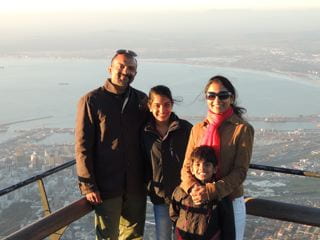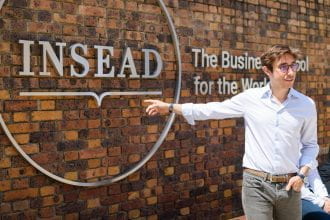Raja Parthasarathy is using his INSEAD MBA to help strengthen his homeland
After two decades working and learning abroad, Raja Parthasarathy, MBA ’99J returned home to India in 2005 to participate in the nation’s vaunted economic miracle. What he saw, though, surprised him, and would challenge him to apply his INSEAD MBA with renewed passion and skill.
The INSEAD alumnus had already spent 22 years in the United States, France, Hong Kong, Singapore and London, logging successful tenures at UBS, Goldman Sachs and Lehman Brothers. Now, back in Mumbai, he began working as Executive Vice President of Finance for Jet Airways, alongside CFO Carl Saldanha and an Indian aviation entrepreneur, Naresh Goyal, who was determined to develop his enterprise into a world-class airline to extend affordable air travel to millions of Indians who had never enjoyed such an opportunity before.
Raja’s initial enthusiasm for “nation-building” was soon tempered by the realities and limitations of the country’s crumbling (or non-existent) infrastructure.
As his routine Delhi-to-Bombay flight circled above the airport for 90 minutes, unable to land because of congestion on the airfield’s single operational runway, Raja realised the extent of the challenges confronting India.
“Then, and over the next few weeks, I started to see that the real bottleneck to the ‘Rising India’ story was not the lack of entrepreneurs or the lack of quality businesses,’ he says. “It was our infrastructure that was going to put the brakes on India’s growth.”
There simply was not—and still is not—sufficient risk capital available for scaling up India’s infrastructure, says Raja, who in addition to his INSEAD MBA holds economics degrees from Tufts University and Hamilton College. This reality prompted him in 2007 to join IDFC, a financial institution focused on infrastructure founded in 2002. Today, he is a partner and managing director there, and he sees clearly the continued hurdles ahead.
“India needs a trillion dollars of infrastructure investment over the next 10 years,” says Raja. Half of this figure he expects to come from government investment with the remainder coming from private participation and requiring some $150 billion in equity capital. “If you add up all available sources of equity capital for infrastructure investment in India, you won’t get past $2 billion,” he estimates. Since 2007, his company has invested nearly $2 billion to help build companies in diverse sectors: renewable energy, education, healthcare, roads and airports, and student housing, among others. “We are the proverbial drop in the ocean, but this journey to build a better India must start somewhere.”
This matter-of-fact perspective is one of the strengths Raja thinks he brings to his work in India, given his INSEAD education and global experience: “I realised that what I could do well was combine an outsider’s objective assessment of a business with an insider’s passion for it.”

Raja and his wife, Manisha, have two children Ananya (14) and Raghav (8) and are indeed committed to helping create a more prosperous future for India. In addition to his professional contributions, Raja is helping India—and INSEAD—by strengthening the school’s network in that country as President of the INSEAD India Alumni Association.
Among a variety of initiatives he has helped organise for alumni was one affiliated with the inaugural Global INSEAD Day, celebrated on September 12, 2013. As part of the many INSEAD events taking place around the world that day, the India Alumni Association partnered with the Pakistan Alumni Association to hold a cricket match in Dubai. The high-spirited game brought together 22 “enthusiastic but not particularly skilled cricket players,” says Raja. All were INSEAD alums and some had flown in for the game from as far away as North America.
“This was an event designed to relive our INSEAD experiences and to ‘build bridges’ between cultures,” he says.
What Raja calls his “irrational passion” and dedication to the school derives from the rewarding experience he had while earning his MBA.
“INSEAD gave me an incredible platform to appreciate multiple points of view and to acknowledge that creative solutions often come from people who view the world with great curiosity and who are not encumbered by the baggage of ‘traditional’ education and professional experience,” he says. Within the school’s dynamic and diverse learning environment, Raja adds, he began to learn how to “embrace ambiguity and uncertainty, to find ways to build consensus and resolve conflicts to solve problems with people from different cultural and linguistic backgrounds.”
The knowledge gained at INSEAD, he says, has helped fuel his success. So, too, has his philosophical approach to life and work. “To me, success is about achieving balance,” says Raja. He likens life to a bicycle wheel with each spoke representing an aspect of the whole—professional duties, family relationships, friendships, financial security, health, charitable giving, and more.
“If any of the spokes are damaged or separated from the wheel, the bicycle would still run fine,” he notes. “But over time that damaged spoke would place pressure on other spokes, which in turn would weaken. Soon enough, this would compromise the integrity of the wheel.”
This search for balance has a connection with Raja’s perspective on business. He ardently believes that business can be a force for positive social transformation, but for this to happen requires a proper understanding of the way things can get out of balance.

“Our greatest global challenge today is the inequality that is growing,” Raja says. “More and more people are being marginalised and this is creating all sorts of problems—from civil disobedience to militant movement, all of which threaten the stability of the world order.”
He sees business playing a leading part in creating a safer, stronger and more abundant world. By itself, and by partnering with other social and governmental institutions, business can create greater inclusion and help those marginalised segments enter the economic mainstream.
“Business can play a powerful role in helping restore greater equality and balance by supporting skill development and creating opportunities for people to earn their livelihood,” he says.
At root, he believes that the right values must guide business leaders. Understanding how business can be a force for greater social good is about understanding “proper stewardship” and safeguarding the world for future generations, says Raja.
“Are we doing things—beyond providing financial and emotional security—that allows our children to inherit a better world than the one we stepped into?” he says. “Are they learning the right values? Compassion plays a big role in all of this.”


